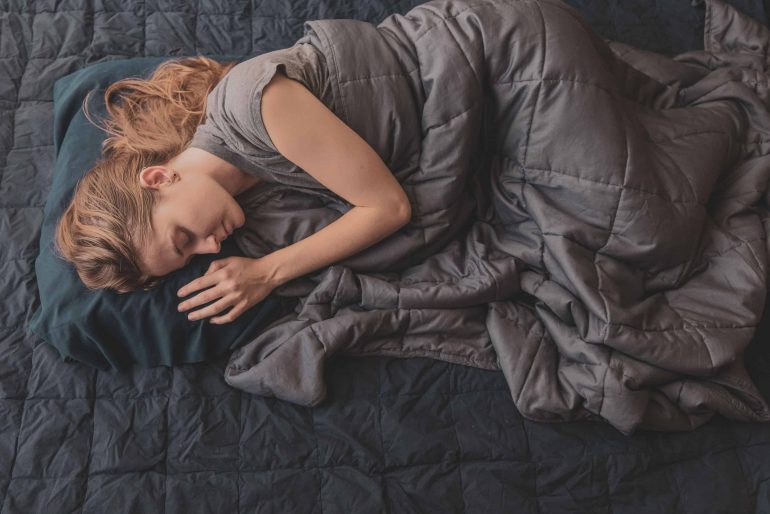Did anyone else feel a shudder run through their spine upon hearing the news: “UC San Diego will be reverting to remote learning until January 17th?” If not then, perhaps a shivering twinge of deja vu when they said, “UC San Diego will be extending remote learning until the 31st?” In one email to the masses, a collective groan was uttered by thousands of Tritons as all-too-recent memories of anxiety and isolation came flooding back. I would stake my student loans on it.
So what do we do now? We still have to live, go to classes, and get through each day. How do we go about managing all of these negative feelings? The basic answer is: there is no one way. Instead, it’s a matter of trial and error–finding what tools and techniques work best for you. However, if you’re not sure where to start, let me offer one suggestion: weighted blankets (a.k.a. pressure therapy)!
Before we start addressing ways to cope with anxiety, let’s back up for a bit. What exactly is anxiety, and how are we affected by stressors like isolation? Stress is a completely normal part of our body’s functioning. It can be defined as “the body’s natural response to a stressor [… to] a trigger that may cause you to experience physical, emotional, or mental distress and pressure.” Our brain has physiological systems in place to deal with these stressors. A typical example is the sympathetic nervous system, better known as our “fight or flight” response. Say we are facing a dangerous situation, such as an oncoming attacker. To face the approaching danger, our body gears up by rushing blood and oxygen away from our extremities and towards our heart, lungs, brain, and larger muscles–those used for running, strategizing, and/or combat. Additionally, it presses pause on our digestion, salivary glands, libido, and other temporarily nonessential functions while we deal with the immediate threat. Once the danger has passed, the brain and body return control to the parasympathetic nervous system, a.k.a. “rest and digest.” Blood and oxygen flow back into the extremities, while digestion and salivation start up again. Our blood pressure, heart rate, and breathing slow down–your basic recouping after encountering a stressor. However, the issue we face today isn’t simply that stress exists but that our stress is sustained for far longer periods than it should be. As students in the 2020s, we are constantly surrounded by mental, emotional, and physical stressors: exams, essays, all-nighters, social expectations, politics, sickness, loss of loved ones, fear of disease, loneliness, what the future holds (or doesn’t hold) for us, etc. Some people are more resilient in high-stress environments than others, but let’s be honest, life is tough right now. It’s a lot for anybody to deal with. Our bodies are constantly gearing up for battles we can’t actually fight or flee from; instead, it sits with this big ball of anxiety, manifesting into chronic disorders. We may experience these repercussions as: “difficulty sleeping, frequent headaches, irritability, brain fog, anxiety, [and/or] depression.” If any of this resonates with you, and you feel like seeking help, I’ve attached a link to an anxiety screening quiz. NOTE: this is not meant to be a diagnostic tool or replace professional evaluations. It’s only meant to provide a little bit more insight into what you might be feeling so that you can start seeking out more information and support.
Now you might be thinking: “I thought this was supposed to be a blog about weighted blankets! When will we start talking about that?” You’ve waited long enough, so I will reward your patience.
First of all, what is a weighted blanket, and why would someone need one? Simply put, it’s exactly what it sounds like. Weighted blankets are sewn with many little pockets, like a quilt, and then filled with weights (glass, wood, beans, etc.)–anywhere from 5 to 30 pounds worth. Think of it like wrapping your body in a hug–a rare luxury during at-home isolation! Weighted blankets are meant to combine heaviness with comfort, simulating deep pressure therapy. Research indicates that this practice can “relieve the perception of pain, reduce symptoms of anxiety, improve sleep quality, relieve symptoms of depression.” The way that this works is through weight’s relationship with the autonomic nervous system. Remember our discussion about our fight-or-flight and rest-and-digest responses? These two systems are both controlled by the overarching autonomic nervous system (ANS).
Autonomic essentially means automatic, and the AND acts in part as the body’s balancing system. It runs without our control to protect us and regulate the function of our internal organs. Here’s where it gets interesting; when our fight-or-flight acts up and sends anxiety and tension throughout our body, weighted blankets (or really any application of deep pressure) actually interfere with our ANS, slowing us down and quickly bringing us to a place of relaxation. Fun fact: this is also why many people benefit from hugs! A study published in the American Journal of Occupational Therapy asked fifty adults to perform tasks before and after wearing a vest that simulated deep-pressure therapy (like a wearable weighted blanket). They found that subjects did better after wearing the vests, most likely due to the “changes in their autonomic arousal.”
Another positive effect of this de-arousal is the lowering of cortisol levels in the body! Cortisol is also called the stress hormone, coursing through us during a fight-or-flight response and alerting you whenever you’re ‘under attack.’ In short spurts, cortisol is very useful, but it shouldn’t run through us on a daily basis. Fortunately, according to a study by Dr. Maurice Ghaly M.D., we can lower cortisol levels using weighted blankets. She had twelve patients “with complaints of sleep dysfunction, pain, and stress” sleep for a period of eight weeks while “grounded,” during which she monitored both their cortisol levels and their circadian patterns. Grounding, or earthing, is the use of gentle pressure–such as a weighted blanket–to gently press the body downwards. Dr. Ghaly hypothesized that by grounding ourselves, we are more likely to sleep soundly and with lower stress. The results of her experiment supported this, with cortisol levels significantly reduced during sleep and the participants experiencing more normalized circadian rhythms. In other words, the practice of grounding improved sleep, pain, and stress levels in all twelve patients.
Other scientists have also found simulating deep pressure relieves anxiety, reduces chronic pain, and improves sleep. One such study was conducted by the Department of Anesthesiology, right here at UC San Diego! Dr. Jennifer Baumgartner and her team wanted to explore pleasure sensation treatments on patients with chronic pain. Specifically, they wanted to study the effects of weighted blankets–which distribute deep pressure over a wide surface area–and whether 5 or 15-pound blankets were more effective in treating pain symptoms. To do this, Baumgartner conducted a “remote, double-blind, randomized controlled trial” wherein ninety-four adults suffering with chronic pain slept with either a 5 or 15-pound weighted blanket for a week. The team compared the subjects’ levels of pain and anxiety before and after the trial, along with a daily rating of their pain intensity, anxiety, and sleep quality. By the week’s end, they found that “the heavily weighted [15 pound] blanket produced significantly greater reductions” in the perceived severity of pain than the lighter blanket.
People suffering from chronic pain aren’t the only ones who stand to benefit from this correlation. For my fellow insomniacs reading right now, the solution to your restless nights might be just one weighted blanket away! Dr. Shanon Danoff-Burg and her team theorized that weighted blankets could improve sleep due to “the deep pressure [they provide…] along with consistent sensory input from its weight, is thought to work by lowering stress and reducing physiological arousal.” To test this, thirty people were randomly selected to participate in a six-week sleep intervention. Each night the subjects slept under a blanket filled with microbeads, equivalent to roughly ten percent of the subject’s body weight. Their sleep quality was measured through daily reporting and ResMed S+ devices to track sleep patterns throughout the night. ResMed is a San Diego-based medical company that specializes in recording movements and breathing to study and treat sleep apnea. After sleeping with weighted blankets for six weeks, the objective data indicated subjects were falling asleep faster and sleeping better, meaning they were not awake or aroused through the night. Subjects also reported feeling more relaxed at bedtime and well-rested in the morning than before the study began.

Living as students in a post-pandemic world, it is easy to let our anxieties overtake us. Why not take some control back? Just because we need to socially distance ourselves, doesn’t mean we should have to feel isolated in the process. Whether you find yourself under stress, in pain, unable to sleep, or simply need a reason to treat yourself–let me recommend weighted blankets as your entrance to some soothing deep-pressure treatment! Not sure where to find one? No worries, I’ve added a list of links below to help you get started! 😊

References:
- https://psychcentral.com/stress/stress-overview#causes
- https://psychcentral.com/quizzes/anxiety-quiz#1
- https://academic.oup.com/sleep/article/43/Supplement_1/A460/5846888
- https://www.healthline.com/health/anxiety/do-weighted-blankets-work#benefits
- https://pubmed.ncbi.nlm.nih.gov/24419314/
- https://research.aota.org/ajot/article-abstract/69/3/6903350010p1/5994/Effects-of-Deep-Pressure-Stimulation-on
- https://www.healthline.com/health/weighted-blanket-for-anxiety#benefits
- https://pubmed.ncbi.nlm.nih.gov/15650465/
- https://www.sciencedirect.com/science/article/pii/S1526590021003138
- https://academic.oup.com/sleep/article/43/Supplement_1/A460/5846888
- https://www.resmed.com/en-us/

